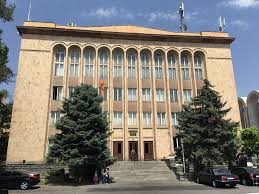
The Constitutional Court of Armenia has asked the European Court of Human Rights to provide an advisory opinion on the Article of the country’s Criminal Code which penalises the overthrowing of the Constitutional order, a provision which is at issue in two cases currently pending in Armenia. Armenia is the second country to seek such an opinion under Protocol No. 16 to the European Convention on Human Rights. France made the first request in October 2018 and the Court delivered its opinion, on rights related to surrogacy, in April 2019. Protocol No. 16 allows the highest courts and tribunals, as specified by member States which have ratified it, to request advisory opinions on questions of principle relating to the interpretation or application of the rights and freedoms defined in the European Convention or its Protocols.
The Armenian Constitutional Court stated that its request had been made in the context of two cases on the constitutionality of Article 300.1 of the Criminal Code, one brought by the Court of First Instance of General Jurisdiction of Yerevan and one by a former President of Armenia, Robert Kocharyan. Article 300.1 of the Criminal Code is entitled “Overthrow of the Constitutional order”. In its questions, the Constitutional Court has asked for guidance from the European Court on certain aspects of Article 7 (no punishment without law) of the European Convention, such as the concept of “law” within the meaning of that provision, the notions of a law’s certainty, accessibility, foreseeability, and stability, and on the principle of the non-retroactivity of a criminal law. An advisory opinion may only be requested in the context of a case pending before the domestic court. The acceptance or refusal of a request is left to the Court’s discretion. A panel of five judges decides whether to accept the request, giving reasons for any refusal. Advisory opinions, given by the Grand Chamber, give reasons and are not binding. Opinions are published and communicated to the requesting court or tribunal and to the relevant High Contracting Party. Judges are entitled to deliver a separate opinion.
The panel and the Grand Chamber include ex officio the judge elected in respect of the High Contracting Party to which the requesting court or tribunal pertains. The aim of Protocol No. 16 is to enhance interaction between the Court and national authorities and thereby reinforce the implementation of Convention rights and freedoms by requesting courts in their adjudication of pending cases.
This press release is a document produced by the Registry. It does not bind the Court. Decisions, judgments and further information about the Court can be found on www.echr.coe.int.




